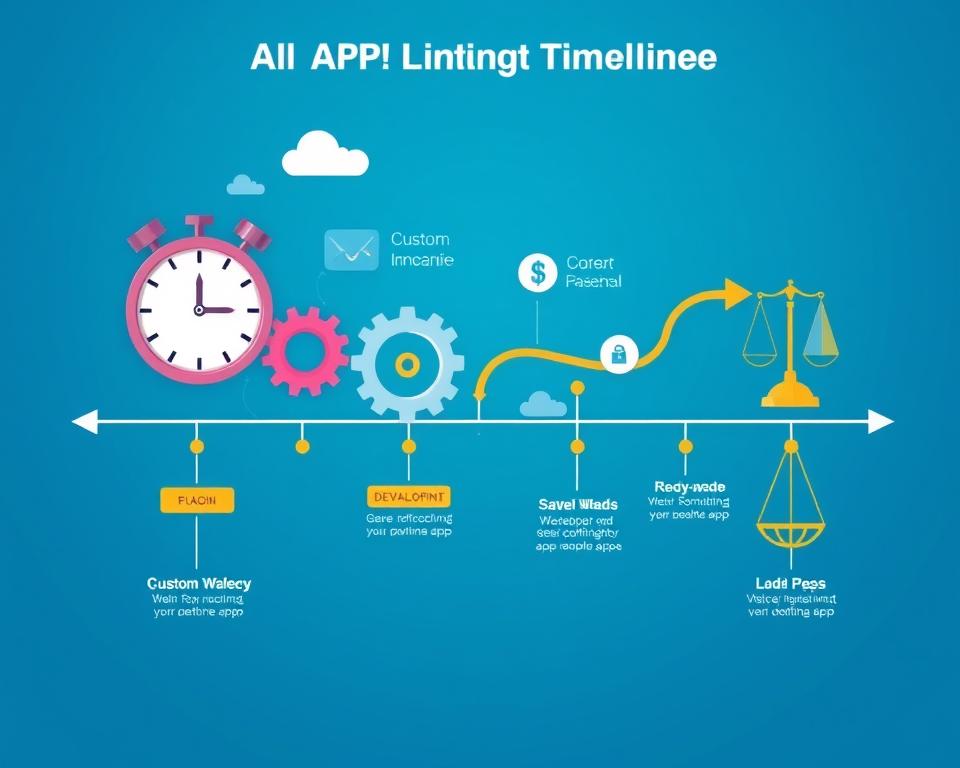Businesses today face a big choice: should they create a custom mobile app or use a ready-made one? The cost of these options is key to a company’s success. We’ll look at what makes one more affordable than the other for your business needs.
Choosing between custom and ready-made apps is complex. It depends on costs, upkeep, growth, and how well you can change the app. Knowing the details of each can help your business pick the best fit for its budget and goals.
Table of Contents
Key Takeaways
- Understand the fundamental differences between custom and ready-made apps in terms of development, features, and costs.
- Evaluate the initial development costs and long-term maintenance expenses associated with each approach.
- Assess the scalability and growth potential of custom-built apps versus off-the-shelf solutions.
- Analyze the customization capabilities and limitations of both options to align with your business requirements.
- Consider the time-to-market advantages and user experience factors when choosing between custom and ready-made apps.
Understanding the Fundamentals of App Development
Creating a mobile app is a detailed process. It starts with an idea and ends with the app being ready for users. The mobile app development lifecycle is key. It makes sure the app works well and is easy to use.
Key Components of Mobile App Development
The main parts of making a mobile app are:
- Frontend Development: This part focuses on the app’s look and feel. It makes sure the app is nice to look at and easy to use.
- Backend Development: The backend handles the app’s inner workings. It includes the server, data storage, and APIs that make the app work.
- Testing and Quality Assurance: Testing is vital to find and fix any problems. It ensures the app works smoothly for users.
Technical Requirements and Infrastructure
Every app needs certain technical things to work. These include:
- Development Platforms and Tools: Apps need special software and frameworks. These help build and test the app.
- App Architecture: The app’s structure and how its parts work together are important.
- Software Development Lifecycle: A clear plan is needed from start to finish. This ensures the app is made well.
- Technical Infrastructure: The app needs servers, databases, and cloud services. These support the app’s running and data storage.
Knowing these basics is key. It helps figure out if making an app is worth it, whether it’s custom or ready-made.
Defining Custom App Development
Businesses have two main choices for mobile apps: ready-made or custom-built. Custom app development means creating a unique app from scratch. It’s tailored to meet a business’s specific needs.
Custom-built solutions tackle unique challenges and offer a competitive edge. They’re made through a team effort. The app developers work closely with the client to understand their goals and needs.
The benefits of custom app development include:
- Precise functionality and features tailored to your business needs
- Improved user experience and brand integration
- Scalability and flexibility to accommodate future growth
- Increased security and compliance with industry regulations
While bespoke software development costs more upfront, the long-term benefits are worth it. Working with a skilled app development team can help businesses create tailored applications. These apps offer a unique edge and a seamless user experience.
| Key Advantages of Custom App Development | Potential Challenges |
|---|---|
|
|
Businesses can decide between custom-built solutions and ready-made apps based on their needs and goals. It’s important to consider the pros and cons.
“A custom-built application is like a tailor-made suit – it fits your business perfectly, while off-the-shelf solutions are more like off-the-rack clothing, which may require alterations to achieve the desired fit.”
Overview of Ready-Made App Solutions
In today’s fast-changing tech world, many are looking for ways to develop apps. Custom apps offer a personal touch, but there’s also a wide range of pre-built apps. These include commercial off-the-shelf software (COTS) or SaaS solutions. They are a cost-effective and efficient way to turn ideas into reality.
Types of Off-the-Shelf Applications
There’s a huge variety of pre-built apps out there. They cover everything from productivity tools and e-commerce sites to social media and task management apps. These pre-built apps come with many features. Users can easily customize and fit them into their current workflows.
Popular Ready-Made App Platforms
Well-known ready-made app platforms include Shopify for e-commerce, Trello for project management, and Slack for team work. These SaaS solutions make it easy to start using them right away. Many app templates are also available online, offering lots of customizable options.
Pre-built apps might not be as customizable as custom-built ones. But they are often cheaper and quicker to use. By using established commercial off-the-shelf software providers, businesses can save time and focus on their main goals.
Initial Development Costs Comparison
Mobile app development costs can differ a lot between custom apps and ready-made ones. Knowing these costs is key to finding the best deal for your business.
The app development budget for a custom app includes hiring a team, buying software tools, and design and testing costs. Ready-made apps have upfront costs like buying licenses or subscriptions. You might also need to pay software investment fees and connect the app with your systems.
| Factor | Custom App Development | Ready-Made App Solutions |
|---|---|---|
| Development Time | Longer, as the app is built from scratch | Shorter, as the app is already developed |
| Development Expenses | Higher, as it requires a dedicated development team | Lower, as the app is pre-built |
| Licensing Fees | None, as the app is owned by the business | Recurring subscription or one-time purchase fees |
By looking at the app development budget, upfront costs, software investment, and development expenses, you can pick the best option for your business.
Long-Term Maintenance and Updates
When looking at custom vs. ready-made apps, maintenance and updates are key. The costs and processes for keeping apps up-to-date can greatly affect expenses. This is true for both custom and ready-made apps.
Upgrade Cycles and Version Control
Custom apps need more updates to meet changing user needs and security. Keeping these apps up-to-date can increase app maintenance costs over time. Ready-made apps, on the other hand, have a simpler update process. The vendor handles updates and version management.
Support and Technical Assistance
Technical support is vital, especially for users who aren’t tech-savvy. Custom apps might need in-house IT or outsourced technical support for help. Ready-made apps usually offer detailed support, like user guides and customer help.
“Effective long-term maintenance and update strategies are crucial for the continued success and viability of any mobile app, regardless of its development approach.”
The choice between custom and ready-made apps depends on your business needs and goals. Knowing the maintenance and update needs for each can help you make a smart choice. This way, you can manage your app maintenance costs better over time.
Scalability and Growth Potential
App development must consider scalability and growth. Both custom and ready-made apps have strengths and weaknesses. They differ in app scalability, business growth, software expansion, and user base increase.
Custom apps are built from scratch. They offer flexibility and adaptability to changing needs. As your user base grows, a custom app can scale and expand. This is great for businesses that grow quickly or plan to expand.
- Custom apps can be modified and scaled for a growing user base and changing business needs.
- They allow for smooth software expansion as the company grows.
- Custom development lets you tailor the app’s app scalability to your needs.
Ready-made apps have a standardized approach to app scalability. This might limit their adaptability to unique business growth and software expansion needs. Yet, they’re good for businesses with predictable user base needs or those needing a quick launch.
“Scalability is a crucial factor in app development, as it determines the long-term viability and growth potential of a business’s digital offerings.”
Choosing between custom and ready-made apps depends on your specific business growth and software expansion needs. Also, consider the app scalability your organization requires.
Custom vs. Ready-Made Apps: Which Is More Cost-Effective?
Breaking Down ROI Factors
Choosing between custom-built apps and ready-made ones depends on ROI factors. Custom apps might cost more upfront but offer long-term benefits. Scalability, customization, and integration are key in this decision.
Total Cost of Ownership Analysis
Understanding the cost-effectiveness of each option requires a total cost of ownership (TCO) analysis. This looks at more than just the initial costs. It includes ongoing maintenance, updates, and support. This way, businesses can see the true cost-benefit over time.
| Factors | Custom-Built App | Ready-Made App |
|---|---|---|
| Initial Development Costs | Higher | Lower |
| Customization Capabilities | Extensive | Limited |
| Scalability | Highly Scalable | Dependent on Platform |
| Maintenance and Updates | Ongoing Costs | Included in Subscription |
| Total Cost of Ownership | May be Higher in the Long Run | May be Lower in the Long Run |
By examining ROI factors and TCO, businesses can decide. They can choose between a custom app or a ready-made one based on their needs.
Time-to-Market Considerations
The app launch timeline and development speed are key in app development. They greatly affect a company’s entry into the market and how it deploys its product. Companies must consider the pros and cons of custom app development versus ready-made solutions. This ensures they can quickly get their product to market.
Custom app development takes longer because the app is built from scratch. This can take months, depending on the project’s complexity and resources. Ready-made solutions, however, have a quicker timeline. They focus on customization and integration after the core functionality is set.
| Key Factors | Custom App Development | Ready-Made App Solutions |
|---|---|---|
| Development Speed | Slower, as the entire application must be built from the ground up | Faster, as the core functionality is already in place |
| Time-to-Market | Longer, due to the comprehensive development process | Shorter, as the application can be customized and deployed more quickly |
| Product Deployment | Can be delayed due to the extended development timeline | Faster, as the application can be up and running in a shorter period |
The choice between custom app development and ready-made solutions depends on the company’s needs, budget, and time. By considering the app launch timeline, development speed, market entry, and product deployment, businesses can make a smart choice. This choice should align with their strategic goals.
Customization Capabilities and Limitations
Choosing between custom and ready-made apps depends on how much you need to change them. App customization is key because it affects how well the app works and fits your needs. It also impacts how easily it can be integrated with other systems.
Feature Modification Options
Custom apps give you the freedom to change and add features as you see fit. You can make the app look and work the way your business needs it to. This is especially important for businesses with unique needs.
Integration Possibilities
Ready-made apps, while less customizable, are great at working with other systems. They’re built to easily connect with many platforms. This makes data sharing and business processes smoother.
So, whether to go for a custom or ready-made app depends on your business needs. You have to weigh the importance of being able to change the app against the ease of integration with other systems.
Security and Compliance Requirements
In mobile app development, app security and data protection are key. Both custom and ready-made apps must follow strict cybersecurity measures and compliance rules. This is to keep user data safe and keep the trust of users.
For custom apps, developers need to focus on strong security protocols. This includes encryption, access controls, and keeping software up to date. These steps are crucial to prevent data breaches and keep the app safe.
Ready-made apps often have built-in data protection and regulatory compliance. While they might cost less upfront, it’s important to check their security and compliance levels. This ensures they meet the needs of your industry.
- Check the app security and data protection of both custom and ready-made apps.
- Know the regulatory compliance rules for your field and make sure your app follows them.
- Consider the ongoing costs of keeping your app’s cybersecurity measures up to date.
“In today’s digital world, the security and compliance of mobile apps are essential. Businesses must focus on these to protect their customers’ data and keep their trust.”
By looking closely at the security and compliance needs of your app, you can choose wisely. Decide if a custom or ready-made app is better for your business based on cost and security.
User Experience and Interface Design
In mobile app development, UX/UI design is key to success. Whether you go for a custom app or a ready-made one, these designs matter a lot. They affect how easy the app is to use, how well it matches your brand, and how happy users are.
Design Flexibility
Custom app development lets you design exactly how you want. You can make the app look and feel just right for your business and brand. This means you can make the app easy to use and look great, matching your brand perfectly.
Brand Integration Options
Ready-made apps, on the other hand, might not fit your brand as well. They’re quick to set up and can save money. But, you might need to change them a bit to match your brand. This could mean adding your logo or colors to make the app look like yours.
| Custom App Development | Ready-Made App Solutions |
|---|---|
| Unparalleled design flexibility to create a unique and visually appealing user interface that seamlessly integrates with your brand’s style, messaging, and overall aesthetic. | Pre-designed interfaces that may not fully align with your brand’s visual identity, requiring additional customization efforts to achieve the desired level of brand consistency. |
| Ability to optimize the user interface for improved app usability and a more intuitive experience for your target audience. | Faster time-to-market and can be cost-effective, but may require additional customization efforts to achieve the desired level of brand consistency. |
Choosing between custom and ready-made apps depends on your business needs, budget, and how important brand and user experience are to you.
Business Size and Industry-Specific Needs
Choosing the right enterprise solutions depends on a business’s size and industry. Large enterprises need custom-built applications that fit with their systems. These bespoke software solutions are flexible and scalable but cost more upfront.
Small and medium-sized businesses (SMBs) might prefer ready-made apps. They are cheaper and come with out-of-the-box functionality for their needs. These niche applications are easy to set up and don’t need much technical know-how, which is great for SMBs with limited resources.
“The right software solution can make or break a business, especially in today’s fast-paced and competitive landscape. Aligning technology with unique industry requirements is crucial for success.”
The decision between custom-built and ready-made apps depends on a business’s needs and resources. Companies with complex, industry-specific software needs might choose custom development. But SMBs might find more value in off-the-shelf solutions. Knowing this balance is essential for a smart and cost-effective tech investment.
Performance and Reliability Factors
Choosing between a custom app and a ready-made one is a big decision. App performance optimization, software reliability, and system uptime are key. They affect costs and user satisfaction over time.
Custom apps are made just for your business. They perform better and are more reliable. They’re built with your specific needs in mind. Ready-made apps, while convenient, might not handle complex tasks as well.
When looking at performance and reliability, think about these points:
- Scalability: How well the app handles more users or data without slowing down.
- Responsiveness: The app’s speed and smoothness, ensuring a great user experience.
- Stability: The app’s ability to keep working well, even when used a lot or in unexpected ways.
- Maintenance and updates: How easy and often updates are done to keep the app secure and working well.
By looking at these factors, you can choose the best app for your business. This choice will help your app meet your goals and keep users happy.
“Reliable and optimized performance is the foundation for a successful app, regardless of whether it’s custom-built or ready-made.”
Conclusion
Choosing between custom and ready-made apps depends on your business’s needs. Look at costs, maintenance, scalability, and customization. This helps pick the best app for your budget and goals.
Whether you choose a custom app or a pre-made one, aim for the best value. Consider the app’s features, user experience, and performance. This way, you make a smart choice that helps your business grow.
The right choice between cost-effective solutions comes from understanding your needs and goals. Find a balance between flexibility, scalability, and cost. This will help you get the most from your software investment and succeed in the digital world.



















